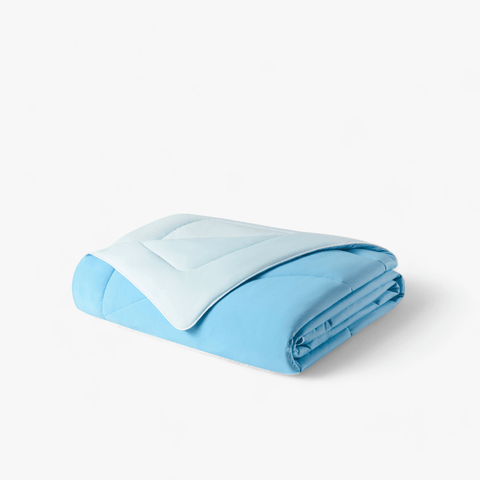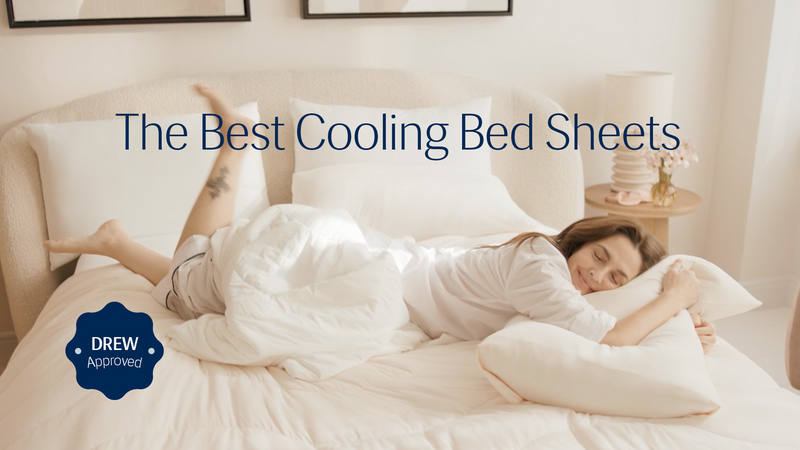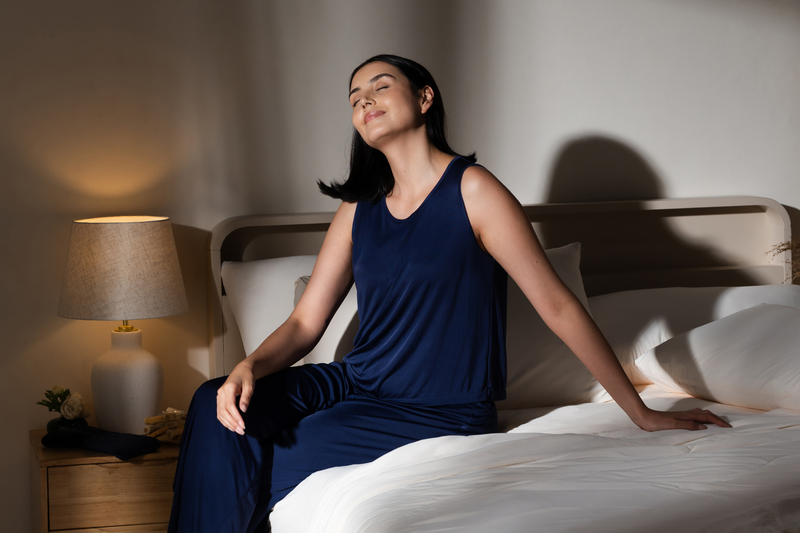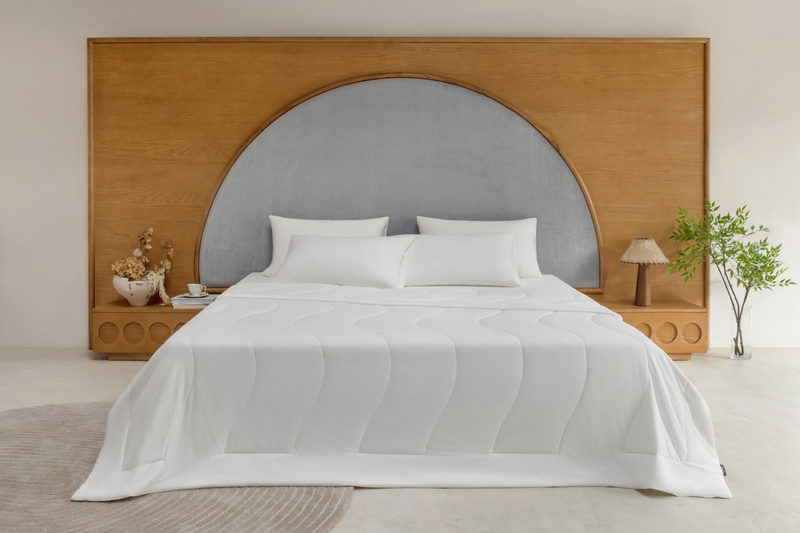Does Cooling Bedding Really Work? Experts Weight In
TL;DR:
Do Cooling Blankets and Sheets Work?
We were recently mentioned in a Washington Post article written by Annie Midori Atherton: We asked experts whether cooling bedding works. Here’s what they said. In it, a question was posed, among the “dizzying array of mattresses, bedding and gadgets designed to keep you from overheating at night”, does cooling bedding even work? And if it does, then how? In anticipation for a hot summer this year, let’s dive into whether products like the Evercool® Cooling Comforter works, and how cooling bedding can get you better sleep.

What are Cooling Beddings?
To understand whether cooling bedding can live up to its hype, we have to understand what their function is. As the Washington Post article prefaces, it’s hard to define because there is no standardization within the industry. “Cooling is an unregulated term, and everyone takes it to kind of mean a different thing,” says Grace Wu, a product analyst at the Good Housekeeping Institute.
For Jamie Ueda, a product tester, cooling bedding is all about the fabric. “If you are a very sweaty sleeper, you want to look for a material that absorbs a lot of moisture and will wick it away.”
At Rest, when we created the Evercool® Cooling Comforter, there wasn’t a product like it on the market. We can proudly say that Rest is the originator of cooling bedding and jumpstarted this product category. As a core value, the “Science of Rest” involves intensive research and development coupled with constant innovation to create our proprietary fabric, Evercool®.
We may be biased because we’ve accomplished it, but our definition of a cooling comforter actually matches that of industry experts: cooling bedding requires cutting-edge technology to create products that are breathable, moisture wicking, and actually cool-to-the-touch.
Are Natural Fabrics Like Cotton and Linen “Cooling”?
Many companies tout the breathability of certain fabrics like linen and cotton to equate it with “cooling”, but actually do not carry this benefit for its end user. For example, a lab test that measure how cool-to-touch a fabric is, called the Qmax value (full blog on Qmax here), scores numerous popular bedding materials below Evercool®. Though many companies advertise natural fabrics like cotton or silk as cooling solutions for hot sleepers, are not actually as cool or moisture-wicking as they say.
How are Performance Fabrics “Cooling”?
Many cooling comforters use materials that promote heat dissipation, breathability and moisture-wicking. “Performance fibers, such as rayon, [which] feels cool to the touch, or nylon, wicks moisture from the body,” Wu says. TENCEL Lyocell (which is derived from wood) is also another popular bedding material for its breathability and cool feeling. Think of these adaptations as the athletic wear of the bedding world. Just as your gym gear wicks sweat and helps you stay dry, cooling comforters like the one made from Evercool® fabric perform similarly for sleepers to whisk away moisture and heat.
How is Evercool® Fabric “Cooling”?
Through material and manufacturing innovations, Rest is able to achieve ultra-fine fibres that are 90x thinner than human hair, and utilizing a special processing called Fully Drawn Yarn (FDY) technique, is crafted into an ultra-fine yarn that emulates a silk protein structure. These supremely thin fibers form complex, capillary-like structures that efficiently absorb and eliminate moisture while quickly dissipating heat to maintain a dry, temperature-balanced sleep environment. The added benefit of such fine yarn being so densely woven into fabric is increased durability, meaning all Evercool® products are machine washable and can even be tumble dry without pilling or lose its cooling effect.

Do Cooling Bed Sheets Actually Work?
As more and more bedding companies promote their products to be “cooling”, understanding how “cooling” is measured and what actually works is integral, and reinforces the work of product experts to provide important, scientific insights. In the same Washington Post article, it was mentioned “Wu has a cooling comforter from Rest, which uses a custom Evercool® fabric made of nylon and spandex that’s designed to be extra moisture-wicking for people who experience night sweats.”
Real People, Real Reviews of Rest Duvet and Rest Comforters Feedback
A litmus test for any product's efficacy is user reviews. Across the board, many sleepers vouch for cooling comforters. Hot sleepers, in particular, often sing praises about how Evercool Cooling Comforter has transformed their sleep experience, banishing those sweaty, restless nights. As an award-winning product with 4,000+ positive reviews, it’s consistently ranked as the best cooling comforter for hot sleepers and the favorite blanket for summers.
However, it’s important to set realistic expectations that while cooling comforters can significantly enhance sleep quality by keeping things cool, they're not portable air conditioners. Their primary role is to regulate temperature, preventing excessive heat buildup. For those living in extremely hot climates, additional measures like fans or air conditioning may still be required for optimal comfort.
Remember, sleep is an investment, not just in time but in quality. With the right cooling comforter, you're not just buying a piece of bedding; you're investing in cooler, better nights of sleep, and waking up to more refreshed days.
 Evercool® Cooling Comforter Evercool® Cooling Comforter |
FAQs of Cooling Bedding
What is the Best Duvet or Blanket for Night Sweats?
The best duvet or blanket for night sweats is typically lightweight and made from breathable materials to promote airflow. And as mentioned previously, it needs to have moisture-wicking properties to help to keep you cool and dry throughout the night. Ticking all the boxes above, plus a fast drying time and quick heat dissipation, Evercool® Cooling Comforter is the best duvet for night sweats.
Can blankets cause night sweats?
Yes, blankets can cause night sweats, especially if they are made from materials that are not moisture-wicking or breathable, which can trap heat. Opting for cooling blankets can help reduce the likelihood of night sweats and help with getting better sleep.
What is the best duvet for hot weather?
For hot weather, a duvet made from lightweight, breathable materials like linen or performance fabrics are ideal. These materials help to regulate body temperature and prevent overheating.
What is the coolest material for a duvet?
The term coolest is quite contentious as some materials can be breathable and good for summer, but are not cooling. For example, linen and bamboo are natural fibers that are relatively breathable, but do not offer much in actually feeling cool to touch. Performance fabrics on the other hand, such as Evercool, feel much cooler to the skin and double up with moisture-wicking properties, which help keep you cool during sleep too.
What is the best lightweight duvet for hot summer weather?
The best lightweight duvet for hot summer weather is one that is made from a combination of breathable, moisture-wicking materials such as bamboo and nylon. These duvets are designed to provide comfort without trapping heat.
Are there any fabrics that help with night sweats?
Yes, fabrics like bamboo and nylon are known for their breathability and moisture-wicking properties, which can help manage night sweats. These bedding and sheets allow for better air circulation and moisture absorption for better airflow and help keep you cool and dry.
Do cooling bed sheets actually work? What bed sheets keep one coolest at night?
Yes, cooling bed sheets can be effective in managing night sweats. These sheets are typically made from materials that wick away moisture and improve airflow, helping to regulate body temperature during sleep. When shopping for cooling bed sheets, consider looking for a high Qmax score, the “cool-to-touch” value that can lead to a cooler sleep. For reference, Evercool is double as cool as silk.
Bedding: What material keeps cool?
Materials like cotton, linen, and bamboo are excellent for keeping cool. They are breathable and have moisture-wicking properties, which help to regulate body temperature and prevent overheating during sleep.
Do black sheets make you hotter?
Black sheets can potentially make you feel hotter because dark colors tend to absorb more heat. However, the material of the sheets plays a more significant role in temperature regulation than the color.
Why do I go to bed freezing, but wake up sweaty?
Going to bed freezing and waking up sweaty can be due to fluctuations in your body temperature throughout the night. This can be influenced by factors such as the type of bedding, room temperature, and your body’s natural temperature regulation processes.
Why do I sweat when I'm cold (in bed)?
Sweating when you're cold in bed can occur if your body is trying to regulate its temperature. Night sweats can also be caused by medical conditions, medications, or hormonal changes that disrupt your body’s normal temperature regulation.
Why do I get so hot when I sleep?
Getting hot while you sleep can be caused by factors such as heavy bedding, a warm room, or your body’s natural temperature fluctuations. Hormonal changes, particularly in women going through menopause, can also contribute to feeling hot at night.
Why do I wake up sweaty in the morning? Why does my head sweat a lot while I sleep?
Waking up sweaty in the morning can be due to overheating during the night, which can be caused by heavy bedding, a warm room, or underlying medical conditions. Ensuring proper ventilation and using breathable bedding can help mitigate this issue
How do you feel after sleeping with night sweat?
After a night sweat, you may feel damp, uncomfortable, and even cold as the sweat evaporates. It can also disrupt your sleep, leading to feelings of fatigue and irritability the next day.
Is it normal to have night sweats after giving birth?
Yes, it is normal to experience night sweats after giving birth. This is due to hormonal changes as your body adjusts postpartum. Night sweats typically resolve on their own as hormone levels stabilize.
What can I do to prevent sweating during sleep?
To prevent sweating during sleep, use breathable, moisture-wicking bedding, keep your bedroom cool, and avoid heavy meals, alcohol or caffeine before bed. Wearing lightweight, breathable sleepwear can also help.
How can hot flashes during menopause be controlled?
Hot flashes during menopause can be controlled by maintaining a cool sleeping environment, using breathable bedding, and avoiding triggers such as caffeine and spicy foods. Hormone replacement therapy (HRT) and certain medications can also help manage hot flashes.
How to treat/deal with severe menopause hot flashes?
Severe menopause hot flashes can be treated with lifestyle changes such as maintaining a cool sleeping environment, wearing lightweight clothing, and avoiding known triggers. Medical treatments including HRT and medications like antidepressants or anti-seizure drugs can also be effective.
What can I buy to help keep myself cool in bed? How to keep your bed cool during summer?
To keep cool in bed, consider purchasing cooling bed sheets, a lightweight comforter or duvet, breathable sleepwear, and a cooling mattress or mattress topper. Many hot sleepers who suffer from night sweats have praised the efficacy of Evercool Cooling Comforter and its Evercool Cooling Sheets as helping significantly improve their sleep, minimizing sleep disruptions due to overheating. Fans and air conditioning can also help maintain a comfortable sleeping environment.
References
- National Institute on Aging. (2022). Menopause: Treatment for Symptoms. Retrieved from NIH
- Mayo Clinic Staff. (2021). Night sweats: Causes. Retrieved from Mayo Clinic
- Harvard Health Publishing. (2020). Overheating at night? Here’s how to stay cool in bed. Retrieved from Harvard Health
- National Sleep Foundation. (2022). Tips for Sleeping in the Heat. Retrieved from Sleep Foundation
- Cleveland Clinic. (2021). Menopause: Symptoms, Causes, Treatment. Retrieved from Cleveland Clinic




 Evercool® Cooling Starter Sheet Set
Evercool® Cooling Starter Sheet Set


